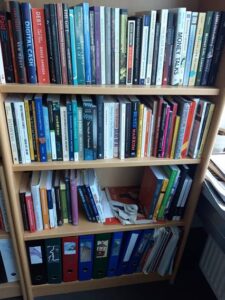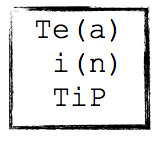We are lucky to have three visiting PhD researchers at ITU at the moment, and the first to sit down for Tea in TiP is Jack Kværnø-Jones.
 RDJ: Hi Jack! Tell us about your project!
RDJ: Hi Jack! Tell us about your project!
JKJ: My research looks at the FinTech sector’s influence on retail banking, exploring how financial professionals connect digital technologies with traditional banking. Within this I’m interested in how the relationships constituting banking are reconfigured FinTech efforts to entangle financial products with social and political ‘problems’, as well as with the emotional states and everyday lives of bank customers. I am based at the Department of Organisation, Copenhagen Business School, and the PhD project is supervised by Ursula Plesner and José Ossandón. The project is funded by the Spar Nord Foundation. I am in the final stage of the project – with around 6 months remaining to get things written up.
I’ve conducted fieldwork with a digital innovation unit in a Danish bank and a payments start-up building a banking platform. During this work I became interested in a particular temporality of financial innovation in banking services, one that ties banking technology imaginaries to strategies and innovation practices, in such a way as to make problematisations a productive activity. For example, banking products and services are increasingly built into a discourse of solving problems, often in the language of financial inclusion, sustainability, or gaining personal well-being from products that claim to give us control and knowledge over our finances. The thesis explores different ways in which the future becomes a kind of organising device, through the discursive delimitation of technology imaginaries; the reconfiguring of banking relationships through digital attachments; and processes of formalizing as start-ups partially reproduce the formal organisation of traditional banking.
RDJ: What you have been working on here at ITU – is it what you came to do?
JKJ: While visiting ITU, I’ve mainly been working on my ‘Kappe’, trying to pull different strands of the thesis together into a coherent framework. A dangerous activity on a research stay at TiP, where one encounters many diverting and interesting discussions and pathways. I’ve particularly enjoyed the weekly salon seminars, hearing about interesting work of other PhDs, as well as the occasional research project playfully communicated as a pitch for venture capital. It’s a great space, where I also received useful feedback on my work. Is it what I came to do? Pretty much, as I mainly wanted to connect with the really interesting work being done at TiP and get the chance to present my work to the group. The nice thing is that when my research stay finishes, I’ll just be over at CBS in Frederiksberg, so I may occasionally bother TiP from across town.
JKJ: What have you learned about academia from visiting another institutional context?
I’ve learnt about the institutional politics of office space and the informal economy of ‘desk squatting’. I’ve also learnt that spaces can be carved out in the university for playful experimentation with interesting and esoteric commitments. I suppose one way such spaces are maintained can be seen in TiP’s interventions in areas like public digitalisation, or through signifiers like the group’s home in ‘Business IT’.
RDJ: How are you handling the pandemic’s effects on your PhD project?
The biggest challenge was data collection. The pandemic hit just as I planned to conduct fieldwork and it put access negotiations into disarray. I handled this partly by rethinking my understanding of the field, and what could constitute a suitable site. This involved a journey of figuring out exactly what I was trying to study, and lead to a multi-sited approach, exploring the intersection between traditional banks and FinTech companies. I also dealt with pandemic restrictions by conducting some observations online. Being allowed to join informants’ Teams meetings was a really useful way of coping with data-collection challenges under the pandemic.
RDJ: Where can we read your work – published or forthcoming – or hear you at conferences in the next year or so?
I’m doing a paper based thesis and one of the papers is published in the Journal of Cultural Economy and available here:
Jack Kværnø-Jones (2022) The significance of boring FinTech: technology imaginaries and value vernaculars in established banks, Journal of Cultural Economy, 15:2, 232-246, DOI: 10.1080/17530350.2021.2002174
The article explores how banking imaginaries interact with articulations of value by financial professionals, in ways that both constrain and potentially open up transformative FinTech possibilities
RDJ: Thanks Jack! Can you leave us with an image that encapsulates your stay?

The joys of squatting a desk with an amazing library for your research topic!
